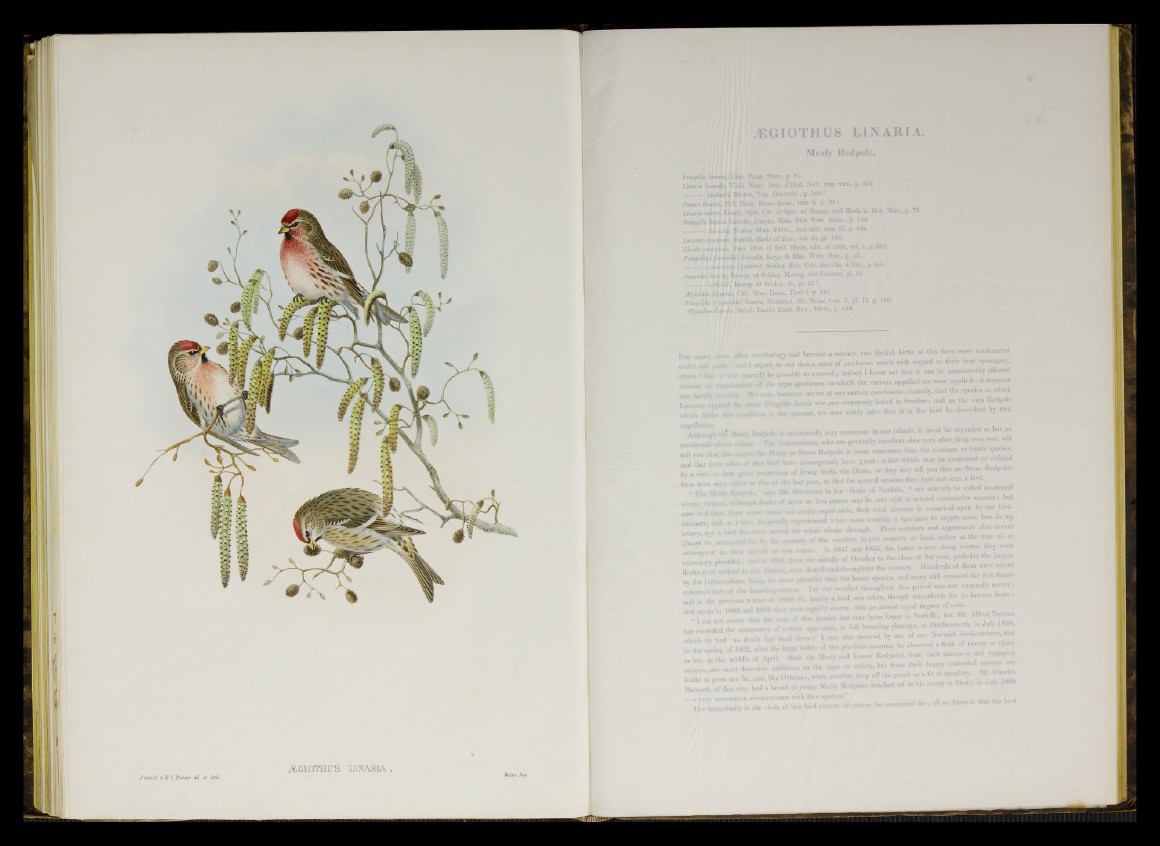
jm O T H irS LINARIA.,
Waller. Im p.
Fringilla liwria, Liiai. Faun. Suec., p. 87.
Linaria horqi&ti VifBi. Nouv. Diet. d’Hist. Nat., tom. xxxi. p. 341.
——— iiipj&iH, Bf' hm, V6g. Deutschl., p. 280 ?
Passer linaria, Pull Zoog. Ross.-Asiat., tom. ii. p. 25 ?
Linaria mhion Leach, Syst. Cat. of Spec, of Mamm. and Birds in Brit. Mus„ p. 75.
Fringilla tnaritkcreilis, Jenyns, Man. Brit. Vert. Anim., p. 139.
- — 4 birfcty Ttanm: Man. d’Orn., 2nd edit. tom. in. p. 264.
Linaria cwM eb , f >ould, Birds of Eur., vol. iii. pi. 193.
Linotg r S f w i Yair. Hist, of Brit. Birds, ed it of 1838, vol. i. p. 508.
Fr'mgillt ( borealis, Keys. & Bias. Wirb. Eur., p. xli.
_ ( | (partim), Schleg. Rev. Crit. des Oss. d’Eur., p.hriii.
Acanthi: Bonap; et Schleg. Monog. des Loxiens, pi. 52.
' f -frittif'i'N et Schleg. ib., pi. 53?
JEginthw frtfatina, Cab. Mus.‘ Hein., Theil i. p. 161.
Frinyillht I(Ul^mhis) linaria, Middend. Sib. Reise, tom. ii. pi. U , p. 150.
/Egiothns ■mmia, Baird, Pacific Railr. Rep., Birds, p. 428.
Foa M.V vc-.r. oA«r ornithology had become a science, two British birds of this form were confounded
under nar .-nn ami i regret to say that a mass of confusion exists with regard to their true synonymy,
, J,u scarcely be possible to unravel; indeed I know not how it can be satisfactorily effected
..... type specimens to which the various appellations were applied—a measure
, may, however, arrive at one certain conclusion—namely, that the species to which
Lim I tyingUh Unarm was one commonly found in Sweden; and as the only Redpole
eoeditem is the present, we may safely infer that it is the bird he described by that
''T lth o d ii tb i Mealy Hedwdr r- occasionally very numerous in our islands, it must be regarded as but an
accidental!winter visitor. T h e bird-catchers, who are generally excellent observers after their own way, will
tell von tl hi 111» season th e Mealy or Stone Redpole is more numerous than the common or lesser species,
and that tliw take, of this bird t o e consequently been g r e a t- a fact which may be confirmed or refuted
bv a visit]to that great emporium of living birds, the Dials; or they may tell you that no Stone Redpoles
,,, the last year, or that for several seasons they have not seen a bird.
.. T1„. L, ¡1.',.- .1,., ¡my, Mr. Stevenson in his ‘ Birds of Norfolk,' •• can scarcely be called an annual
, „¡thjmgh flocks of more or less extent may be met with in several consecutive seasons ; but
Wl" r p !lu,0 ' frota mit easily explainable, their total absence is remarked upon by our bird-
" Z l i Z ' and, as I • n '■ irequculU experienced when most wanting a specimen to supply some loss in my
i b.ls been n e tted the whole winter through. Their numbers and appearance also cannot
7 ’ . v.. sevcriiy of the weather, in this country at least, either at the time of, or
h * f t to their arrival on our const,. In 184/ and 1855, the latter a very sharp winter, they were
su sequ n ■ October to the close of the year, probably the largest
~ distributed throughout the country. Hundreds of them were netted
1 the liird-cntchcrs beirnt far more plentiful titan the lesser species, and many still retained the neb flame-
i thp l.r.- vwcitHifti. Yet the weather throughout this period was not unusually severe ;
•m riiwhe previous winter of SHo?> fil, hardly a bird was taken, though remarkable for its intense frosts;
J,K. 1M, and lwi( lta.v ncre eqtmlly «earce, with an almost equal degree of cold.
<■ i f ,,, not aware that the m-st of this specica has ever been found in Norfolk; bat Mr. Alfred Newton
.¡mM. in full breedine-nhitnage, at Riddlesworth, in July 1848,
n f iifh e r e ■ 1^ ^ , aUo atwmcd by one of our Norwich bird-catchers,that
r„"hc frillg of 1862, after the large influx of the previous autumn, he observed a flock of twenty orrtnrty
a. latt Is the middle of April. Both tin Mealy and Lesser Redpoles, from them tameness and engagtng
actions, are most desirable additions to the cage or aviary, hot from their happy contented nature, are
liable to grow too fat, and. like Ortolans, when overfed, drop off the perch to a fit of apo,dex, * • £ £ >
Barnard, of this city, had a brood of you,* Mealy Redpoles hatched off m Ins avtary a, StoU, ,n July 1860
- a | cry uncommon circumstance with this " „ klM)„ is tliat the bird
T l,. irregularity in the visits of this bird cannot, nl com sc, he aceountcu